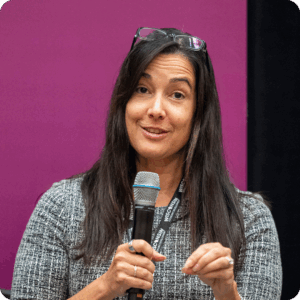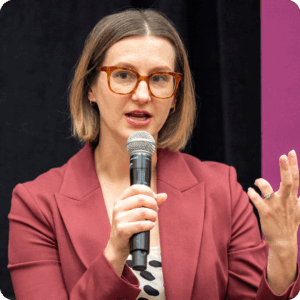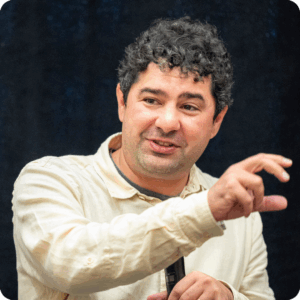
Panelists gathered at the Wisconsin Economic Summit to discuss unlocking investment in Wisconsin’s startups.
When Dana A. Guthrie started out as an emerging fund manager, she was surprised to find Wisconsin didn’t compare well to the rest of the nation when it came to the amount of capital invested into the state.

Dana Guthrie of Gateway Capital
“I never understood that—because to me, we had all of the assets and the ingredients,” Guthrie said. “All around Wisconsin, we have thriving businesses and corporations. We have great university systems … It just wasn’t quite working together.”
Guthrie—who is now managing partner at Gateway Capital, a Milwaukee-based venture capital fund—remembered thinking that Wisconsin could put itself on the map when it came to venture investment by working collaboratively within the state.
“Our part in that is taking a look at early-stage venture capital,” Guthrie said in a panel discussion titled “Broadening Risk Perspectives to Encourage Innovation and Growth” at the 2025 Wisconsin Economic Summit held in mid-October.
Guthrie was joined on the panel by Maggie Brickerman, incoming president of the Wisconsin Technology Council; Laura Strong, founder and chief executive officer of the Madison-based Valency Fund; and Scott Resnick, cofounder of Hardin Design & Development in Madison.
Broadening the focus of entrepreneurship
As an emerging fund manager, Guthrie works with entrepreneurs for their first or second funding round, when they don’t yet have an established track record.

Laura Strong, Ph.D., of Valency Fund
“Wisconsin has a history of entrepreneurial success,” Guthrie said. “I don’t think we realize just how unique that is.” Now, Guthrie said, it’s a matter of expanding that history from manufacturing into fast-growing areas such as technology, software, data, and artificial intelligence (AI).
“We love to look at things where the Midwest or Wisconsin has the right to win,” said Guthrie, noting that Wisconsin is just as likely to be the source of the next manufacturing AI innovation as a company on one of the coasts.
Targeting the “in-between space”
Strong views risk capital as a spectrum, ranging from bank loans to “very high-risk but also high-reward” venture capital. “There’s a huge space in between there, and this is actually what my fund was designed to target,” Strong said.
“You’ve got businesses in Wisconsin that are growing. You’ve got a lot of companies that could scale. They need catalysts. They need money. They need risk capital,” Strong said, calling for Wisconsin’ investors to “be innovative and creative on the financing of our business strengths in that in-between space.”

Maggie Brickerman of the Wisconsin Technology Council
When companies expand, they create more jobs and wealth in the community and state, with high-paying high-tech jobs having an added halo effect, Brickerman said. “When you think about the overall economy, we need that slice to be fired on all cylinders if we’re going to really meet our full potential.”
Building the pipeline
In Wisconsin, the environment is much more open and accessible to entrepreneurs looking for risk capital compared to many other places, even if funding isn’t always forthcoming, panelists said. “We’re really looking for people to collaborate with,” Strong said.
“It’s never too early to reach out, because one of the things that we’re looking for is to help build our pipelines,” Strong said. “We want the best companies. We want to make the best investments. And it kind of relies on us to be scouts, to be mentors, to look at a company that’s maybe two years from needing us, or a year from needing us, and to say, ‘Ooh, are you thinking about this? Are you thinking about that? Because we want you to be ready.’”
Making connections between fund managers and entrepreneurs “requires hustle on both parts,” Resnick said. “On the part of the fund

Scott Resnick of Hardin Design & Development
manager, it is making sure there is outreach” to communities and entrepreneurs. For entrepreneurs, Resnick said, “It’s having the bold nature to be able to try to put themselves in the position to succeed, to be in the same rooms where you are seeing capital providers.”
“Find strong mentors that are able to guide you through the journey,” Resnick advised. “That mentorship you can find throughout the entire state. Every company you can think of started out at some point with one employee and grew to something new and bigger.”
Resnick expressed frustration with the number of times out-of-state venture fund managers “find a way to break into our communities and see the potential of our entrepreneurs that we locally might have missed out on.”
“I think that’s where Wisconsin takes its next step—to say, ‘No, we can believe in ourselves,’” Resnick said. “And that’s what I want to see more of.”
